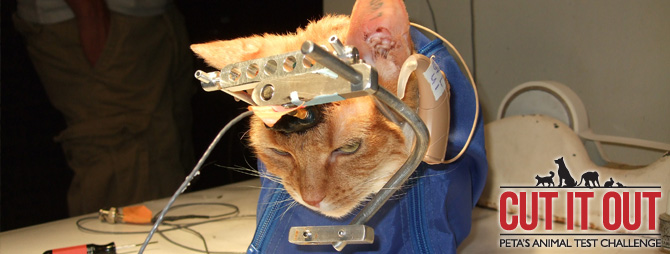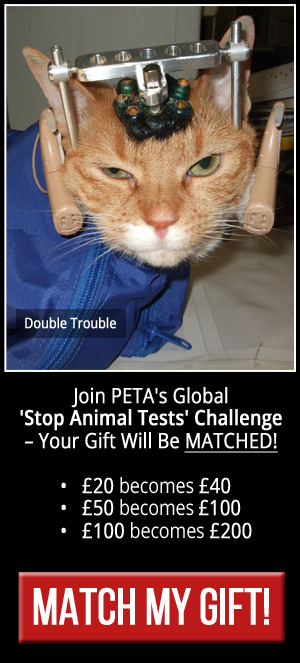Celebrating 20 Years of Humane
Science Education! A new school year brings a
fresh start for students and teachers who want to stop the senseless sacrifice
of millions of animals—including cats, frogs, sharks, and fetal pigs—used in
school science labs.
AAVS's Animalearn division has
all the tools needed to ditch dissection and embrace non-animal methods, but we
need your help to make sure they get into the schools.
We can do it! This year marks the 20th anniversary of Animalearn's The Science Bank, our free loan program of high quality humane science education alternatives, which allow students to learn without harming animals.
With your help, we can end classroom cruelty!
Ban Cosmetic Testing on Animals
 Target: Representative Joseph Pitts, Chairman of the House of Representatives Subcommittee on Health
Target: Representative Joseph Pitts, Chairman of the House of Representatives Subcommittee on Health
Goal: End cruel cosmetic testing on animals with a country-wide ban on the practice and sale of products tested on animals.
A ban on cosmetic testing on animals was introduced to the U.S. House of Representatives by Representative Martha McSally of Arizona. Not only would the bill ban testing on animals, it would also ban the sale and transportation of such products within the United States. More than 30 nations have taken action to ban cosmetic testing on animals. However, several developed nations, including Canada and the United States, have yet to put an end to this outdated and cruel practice.
During cosmetic testing, small animals such as rabbits, guinea pigs, and mice are exposed to ingredients found in cosmetics like lipstick, shampoo, and nail polish. To test a product’s skin and eye irritation, products are rubbed on animals, while others may be force-fed to animals in order to test for everything from birth defects to causes of death.
There are countless alternatives to animal testing. Companies can produce products with safe materials instead of testing new materials on animals. They can also use science’s technical advancements to replace the use of animals with more modern and cruelty-free options, like artificial skin that replaces the need for animal skin.
Representative McSally’s proposed legislation would put an end to cosmetic testing on defenseless animals. Countless nations have already taken steps to end this inhumane practice. It is America’s turn to ban animal testing. Sign the petition to voice your support for Representative McSally’s bill, which is currently sitting in the House of Representatives’ Subcommittee on Health, where is has remained for over a year. PETITION LETTER


Tell AirBridgeCargo Airlines to Adopt a Ban on Transporting Monkeys for Experimentation!
 We've received disturbing reports that the Russian airline AirBridgeCargo is regularly shipping monkeys from China to the U.S., where they will be cruelly experimented on in laboratories. PETA and our supporters have persuaded nearly every major airline in the world—including Air China, China Eastern Airlines, China Southern Airlines, Philippine Airlines, and United Airlines—to stop transporting monkeys to laboratories, yet it seems that AirBridgeCargo is falling behind this compassionate industry standard and scheduling shipments of monkeys from China at least twice a week.
We've received disturbing reports that the Russian airline AirBridgeCargo is regularly shipping monkeys from China to the U.S., where they will be cruelly experimented on in laboratories. PETA and our supporters have persuaded nearly every major airline in the world—including Air China, China Eastern Airlines, China Southern Airlines, Philippine Airlines, and United Airlines—to stop transporting monkeys to laboratories, yet it seems that AirBridgeCargo is falling behind this compassionate industry standard and scheduling shipments of monkeys from China at least twice a week.
Every year, thousands of nonhuman primates are transported from countries such as China, Mauritius, and Vietnam to the U.S. and the European Union to be imprisoned in laboratories and tormented in experiments. Some are bred in captivity on cramped, squalid factory farms, while others are taken from their families in the wild. The traumatized monkeys are crammed into small wooden crates and transported in the dark and terrifying cargo holds of planes for as long as 30 hours. It was reported to PETA that shipping crates carrying primates and being handled by AirBridgeCargo were leaking urine and feces and that some monkeys in poor condition were denied any assistance or care. Once the animals arrive in the U.S., they are transported to facilities where they're imprisoned in tiny cages and often cut open, poisoned, crippled, addicted to drugs, shocked, and killed.
Please write to AirBridgeCargo and let it know that cruelty doesn't fly and that it should join other industry leaders—including Delta Air Lines, American Airlines, United Airlines, Air China, China Eastern Airlines, China Southern Airlines, El Al Airlines, Philippine Airlines, Hainan Airlines, Vietnam Airlines, and dozens of others—that refuse to take any part in this violent industry and prohibit the transportation of primates to laboratories.
| PROBLEM: Sacrificing animals for education is unnecessary, wasteful,
and costly. SOLUTION: Alternatives are effective, environmentally sound, and budget friendly. |
We can do it! This year marks the 20th anniversary of Animalearn's The Science Bank, our free loan program of high quality humane science education alternatives, which allow students to learn without harming animals.
With your help, we can end classroom cruelty!
Ban Cosmetic Testing on Animals

Goal: End cruel cosmetic testing on animals with a country-wide ban on the practice and sale of products tested on animals.
A ban on cosmetic testing on animals was introduced to the U.S. House of Representatives by Representative Martha McSally of Arizona. Not only would the bill ban testing on animals, it would also ban the sale and transportation of such products within the United States. More than 30 nations have taken action to ban cosmetic testing on animals. However, several developed nations, including Canada and the United States, have yet to put an end to this outdated and cruel practice.
During cosmetic testing, small animals such as rabbits, guinea pigs, and mice are exposed to ingredients found in cosmetics like lipstick, shampoo, and nail polish. To test a product’s skin and eye irritation, products are rubbed on animals, while others may be force-fed to animals in order to test for everything from birth defects to causes of death.
There are countless alternatives to animal testing. Companies can produce products with safe materials instead of testing new materials on animals. They can also use science’s technical advancements to replace the use of animals with more modern and cruelty-free options, like artificial skin that replaces the need for animal skin.
Representative McSally’s proposed legislation would put an end to cosmetic testing on defenseless animals. Countless nations have already taken steps to end this inhumane practice. It is America’s turn to ban animal testing. Sign the petition to voice your support for Representative McSally’s bill, which is currently sitting in the House of Representatives’ Subcommittee on Health, where is has remained for over a year. PETITION LETTER
Thousands of Dogs in Laboratories Need You Now. More than 61,000 dogs suffered in U.S. laboratories last year—many of them were cut up, killed, and dissected. Support PETA's work to free animals from laboratories by October 31, and have your gift doubled through PETA's Animals Out (of the Labs) Challenge, up to our goal of $500,000. MATCH MY GIFT
This University Left Unwanted Baby Animals to Die. Dead animals at Tel Aviv University were reportedly left inside cages with live ones, and the cages contained so much dirt and waste that they were teeming with maggots, flies, and other insects. E-MAIL THE SCHOOL NOW
Tell AirBridgeCargo Airlines to Adopt a Ban on Transporting Monkeys for Experimentation!

Every year, thousands of nonhuman primates are transported from countries such as China, Mauritius, and Vietnam to the U.S. and the European Union to be imprisoned in laboratories and tormented in experiments. Some are bred in captivity on cramped, squalid factory farms, while others are taken from their families in the wild. The traumatized monkeys are crammed into small wooden crates and transported in the dark and terrifying cargo holds of planes for as long as 30 hours. It was reported to PETA that shipping crates carrying primates and being handled by AirBridgeCargo were leaking urine and feces and that some monkeys in poor condition were denied any assistance or care. Once the animals arrive in the U.S., they are transported to facilities where they're imprisoned in tiny cages and often cut open, poisoned, crippled, addicted to drugs, shocked, and killed.
Please write to AirBridgeCargo and let it know that cruelty doesn't fly and that it should join other industry leaders—including Delta Air Lines, American Airlines, United Airlines, Air China, China Eastern Airlines, China Southern Airlines, El Al Airlines, Philippine Airlines, Hainan Airlines, Vietnam Airlines, and dozens of others—that refuse to take any part in this violent industry and prohibit the transportation of primates to laboratories.
| ||||












